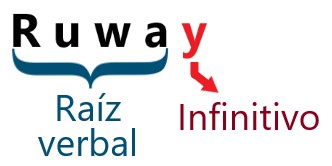The good news is that virtually all Quechua verbs are conjugated in the same way, all are regular verbs (Although there is an exception, but it does not vary much😅)

1. Present simple
To conjugate verbs in Quechua, the suffix -y of the infinitive verb must be removed and then we add to the root (raiz verbal) the ending indicating the grammatical person and tense (in this case present simple).
In the previous lesson we saw the verbs in their infinitive mode, to get the root we simply remove the ending “-y” which makes the verb infinitive.

The formula for conjugation in the present simple is as follows:
Verb root (raíz verbal) + verb ending
Conjugating the verb Ruway (to do, to make)
An example is worth a thousand paragraphs of explanations, so I show you how the conjugation in Quechua is with a practical example. Remember that all verbs are conjugated in the same way.
This time in bold, italic and blue I put the verb endings.
| Pronoun | Verb | Meaning |
| Noqa | ruwani | I do |
| Qan | ruwanki | You do |
| Pay | ruwan | He does / She does |
| Noqanchis | ruwanchis | We do (including the addressee[s]) |
| Noqayku | ruwayku | We do (not including the addressee[s]) |
| Qankuna | ruwankichis | You [guys] do |
| Paykuna | ruwanku | They do |
As you can see, the verb root always remains the same, you just have to add the endings: -ni, -nki, -n, -nchis, -yku, -nkichis, -nku, this applies to all verbs, only in the verb Kay there is a slight change and, of course, there are also verbs that cannot be conjugated in 1st and 2nd person, for example rain, you cannot say: I rain, you rain.
On the other hand, as in Spanish (but not in English) the pronoun can be tacit or omitted, if someone says “ruwanki” it is understood that he is talking about “qan” (you), so “qan ruwanki” and “ruwanki” are almost the same: “you do”, the only difference is that “qan ruwanki” is more emphatic.
Note that in Quechua there are no ambiguities between you and you [plural], there is never confusion between “you do” (qan ruwanki) and “you do” (qankuna ruwankichis).
If you already get the idea, you can move on to the next lesson, because from now on I will only put repetitive examples conjugating other verbs:
Conjugating the verb Kashay (to be [in a place])
| Present simple | To be [in a place] |
| Noqa kashani | I am |
| Qan kashanki | You are |
| Pay kashan | He is / She is |
| Noqanchis kashanchis | We are (including the addressee[s]) |
| Noqayku kashayku | We are (not including the addressee[s]) |
| Qankuna kashankichis | You [guys] are |
| Paykuna kashanku | They are |
Conjugating the verb Riy (to go)
| Present simple | Meaning |
| Noqa rini | I go |
| Qan rinki | You go |
| Pay rin | He goes / She goes |
| Noqanchis rinchis | We go (including the addressee[s]) |
| Noqayku riyku | We go (not including the addressee[s]) |
| Qankuna rinkichis | You [guys] go |
| Paykuna rinku | They go |
Conjugating the verb Munakuy (to love)
| Present simple | Meaning |
| Noqa munakuni | I love |
| Qan munakunki | You love |
| Pay munakun | He loves / She loves |
| Noqanchis munakunchis | We love (including the addressee[s]) |
| Noqayku munakuyku | We love (not including the addressee[s]) |
| Qankuna munakunkichis | You [guys] love |
| Paykuna munakunku | They love |
As you can see, all the verbs are conjugated in the same way, with the exception of the verb Kay, before reaching that topic, let’s continue laying the groundwork, let’s move on to the present continuous.